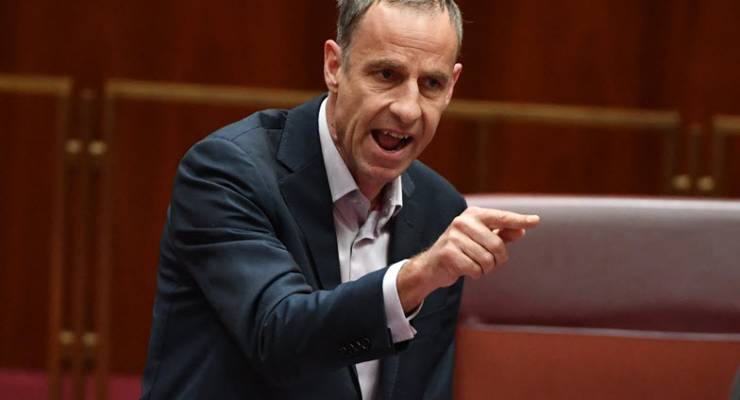
The value of some of Australia’s dirtiest companies tumbled after the Greens secured several victories in Labor’s key climate policy, but the powerbroking minor party declared the fight against “the psychopaths running the big corporate polluters and their political puppets” is far from over.
The Albanese government confirmed a hard cap on the 215 fossil fuel companies bound by the safeguard mechanism, Labor’s crown jewel in the climate fight, as well as a pollution trigger that will see Climate Change Minister Chris Bowen scrutinise projects against the cap and carbon budget.
The changes mean companies will not be able to buy an infinite number of carbon credits — which some experts claim are junk — while continuing to pollute as normal.
The new rules for some of the country’s most profitable companies ricocheted through the ASX on Monday. Woodside Energy was down 3%, Santos 1.8%, BHP 0.4% and Whitehaven 1.9%, and overall the ASX200 energy index was down 2.3%.
This morning, however, there were small signs of recovery — Santos stocks climbed 0.02% and Woodside climbed 0.66%.
Economist and executive director of The Australia Institute Richard Denniss said the share market’s initial reaction to the safeguard mechanism changes showed the Greens had delivered “something significant” that effectively created “a hard limit on how many fossil fuel projects can go ahead”.
“Labor’s plan to let gas and coalmines rely entirely on offsets to meet their “emission reduction targets” made life pretty easy for the fossil fuel industry,” Denniss told Crikey.
“The sell down in gas stocks yesterday suggests analysts think the ‘hard cap’ on actual emissions demanded by the Greens will force the government to make some hard choices about how many new projects can go ahead.”
The concessions, which Bowen said were in keeping with Labor’s election promises and policy agenda, end months of high-stakes negotiations to secure the Greens’ powerful yay votes in Senate seats — votes needed to pass one of the country’s most ambitious climate policies.
Beetaloo’s future in dispute
Despite the Greens failing to secure a ban on all new fossil fuel projects (as per the UN’s and International Energy Agency’s urging), Greens Leader Adam Bandt saw the day as a net positive. He declared that it would tank about 116 projects in the pipeline that would find it impossible to keep their emissions below 140 million tonnes a year.
“The Greens have stopped about half of them [in the pipeline] but Labor still wants to open the rest,” Bandt said on Monday. “And, so, now there is going to be a fight for every new project that the government wants to open.”
Bandt named the “derailed” Beetaloo and Barossa gas fields in the Northern Territory as two scuppered by the amendments — although Beetaloo developer Tamboran Resources waved that away as “100% wrong” because the project was aiming to be net zero.
Despite the developer calling for calm, Tamboran shares fell 6.7% to 21 cents on Monday.
What next for climate action?
Outspoken Greens Senator Nick McKim went harder than Bandt in a series of tweets, firing off an extraordinary broadside against the government, the heads of fossil fuel giants, and even unnamed senior figures in Australia’s environmental movement.
“The fight against the psychopaths running the big corporate polluters, and their political puppets, goes on,” he said. “We have been in negotiations with the corrupt, ecocidal government of a petro-state that was prepared to hold a gun to the head of future generations by threatening to blow up climate action unless they could continue to approve massive new coal and gas projects.”
McKim said it was “gutting” to listen to “senior figures in the enviro movement publicly regurgitating ALP speaking points while negotiations were at a critical stage”, continuing “the movement has some lessons to learn”.
Woodside a ‘drug dealer’: Greenpeace
The Australian Conservation Foundation’s acting CEO Paul Sinclair said the next fight should be against the pollution Australia exports through coal and gas, which amounts to “twice what we produce at home”.
“The safeguard mechanism only covers domestic emissions — most of the pollution from Australian fossil fuels comes when exported coal and gas is burnt overseas,” he said. “Attention should now turn to replacing our coal and gas exports with clean exports.”
Head of advocacy and strategy at Greenpeace Australia Pacific Glenn Walker agreed, and said Australia was “one of the top three global dealers in these toxic fossil fuels”.
“Like drug dealers, it’s disingenuous for big polluters like Woodside to simply claim the serious harm caused by their products is not their problem because their customers want it so badly,” he said.
McKim finished with an ominous warning for those celebrating the Labor-Greens deal as a sign the climate wars have ended: “Think again. They have barely begun.”








Emma, I might have chosen an adjective like “terrific” rather than “extraordinary”. But here are McKim’s own words, cut-and-pasted from twitter:
“It’s done. Australia’s emissions will be significantly less than they would have been because we were prepared to stand up for a safe climate and a liveable planet. But the fight against the psychopaths running the big corporate polluters, and their political puppets, goes on. We have been in negotiations with the corrupt, ecocidal government of a petro-state that was prepared to hold a gun to the head of future generations by threatening to blow up climate action unless they could continue to approve massive new coal and gas projects. Our negotiating position was unfortunately not as strong as it could have been. It was hard enough negotiating with the political arm of fossil fuel corporations without having our position actively undermined by people who should know better. Listening to senior figures in the enviro movement publicly regurgitating ALP speaking points while negotiations were at a critical stage was gutting. For the ACF to urge us to walk away from our demand for no new coal and gas at a crucial time was nothing less than culpable. There are honourable exceptions, but the movement has some lessons to learn. It needs to focus less on lobbying and careerism and more on activism and campaigning. We need people in the streets. For anyone who thinks the climate wars are over, think again. They have barely begun.”
Hear hear, I say.
That was a great speech from McKim. I recently watched Bernie Sanders interviewed on Politics Joe, stating that corporate elites have declared war on the working class.
Albanese, the class traitor, is following orders.
It’s time The Greens, and the rest of us GOT ANGRY, took some direction from the French, demand real action from OUR government, or shut the joint down.
Another thrilling political speech in which you get to see and hear the authentic person instead of the politician. Sadly it’s so rare. The entire parliament, or those who bothered to turn up to do the job we pay them to do, should be squirming in their cushy seats just like Abbott on that other memorable occasion. Shame. Shame. Shame.
Good for McKim. Nice to see someone come out swinging again after years of ineffectual diplomatic language.
“the psychopaths running the big corporate polluters, and their political puppets” – nice summation of the major parties and the fossil fuel industry (and other polluters, like plastics)
Would that be a nod in the direction of the origin of the Adani/ BRAVUS fortune?
Was lucky enough to hear this speech on the radio. It was flaming brilliant.
At the next federal election the Coalition & ALP will see evidence that the wars have definitely only just begun. Imagine what havoc the weather will have wreaked upon the nation by then.